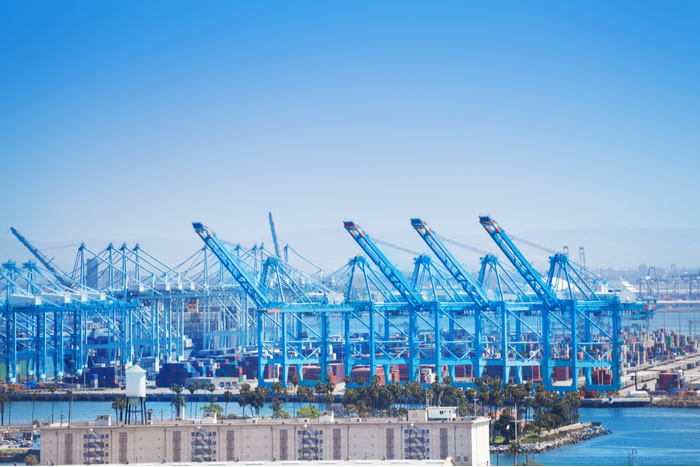US West Coast dockworkers are supporting proposed legislation in California that would give a state agency the ability to approve or reject automation projects at the state’s seaports.
A bill currently under consideration in Sacramento would authorize the State Lands Commission to approve on a case-by-case basis the use of automated technology at seaports within its jurisdiction, which includes the ports of Los Angeles and Long Beach.
If approved, the bill would make it more difficult for terminal operators to automate despite being explicitly allowed to do so under language in collective bargaining agreements ratified by the International Longshore and Warehouse Union (ILWU) in 2008 and incorporated into successor agreements, including the current deal that expires in 2022.
The bill is scheduled for a hearing on July 9. A legislature committee analysis should be out before that, which will describe what the bill would do and detail the arguments of supporters and opponents.
The bill comes as the ILWU challenged plans by APM Terminals to automate a 100-acre portion of the Port of Los Angeles’ Pier 400 facility with the use of automated (unmanned) straddle carriers for horizontal transportation of containers. The Los Angeles City Council on June 28 voted 12-0 to veto the Los Angeles Harbor Comission’s approval of a construction permit, sending it back to the port for further consideration.
The construction permit APM Terminals seeks is meant to provide electrical power for refrigerated containers as well as to charge batteries that would power the auto-strads. While the ILWU is attempting to block issuance of the permit as a strategy to kill the automation project, APM Terminals stated in a letter to the Los Angeles City Council member who sponsored the motion that if the permit isn’t approved, it will use diesel units instead. This runs counter to the Los Angeles-Long Beach Clean Air Action Plan, which has set a goal for terminal operators of deploying zero-emission (electric) cargo-handling equipment by 2030. The Los Angeles Harbor Commission will meet later this month to reconsider its vote on the construction permit, which passed last month on a 3-2 vote.
Business groups oppose bill
The bill in Sacramento, AB 1321, is supported by Los Angeles Mayor Eric Garcetti, but it has drawn opposition from business groups including the California Retailers Association and the California Chamber of Commerce, as well as the Pacific Maritime Association (PMA), which bargains with the ILWU. The PMA, which negotiated the 2008 contract and subsequent deals that include the right of terminals to automate, says the issue of automation is already covered by the longshore collective bargaining agreement.
“[The bill] would circumvent the collective bargaining agreement between the ILWU and PMA, which expressly allows for automation,” the group said. “This bill would place an unnecessary burden on the State Lands Commission to evaluate basic business operations at all port facilities, including, for example, automated phone answering systems, parking lot payment systems, and vending machines.”
The California Chamber of Commerce, in a June 28 letter opposing the bill, echoed PMA’s stance that automation is already covered under current agreements and does not require “any other port, city or state approval.”
“We are also concerned that such legislative action could interfere with efficient operations at our ports and result in further delays to our intermodal transportation system,” the chamber added.
In opposing the bill, Maersk noted the loss of market share California ports have experienced and warned of further losses if the approval process for terminal automation were made more complex.
“It is critical that the ports remain competitive by increasing efficiencies while decreasing emissions. The Ports of [Los Angeles/Long Beach] have already lost 20 percent of their market share,” Douglass Ludwig, director of government relations for A.P. Møller-Maersk, said in a June 28 letter. “Without careful consideration of the local, national and global impacts that automation will bring, the state has the ability to jeopardize 68,253 in direct, induced, and indirect discretionary cargo jobs in the Southern California economy.”
California Governor Gavin Newsom in May issued an executive order creating a task force to look at the impact of automation and artificial intelligence on the California economy and workforce. The marine terminal automation issue could get referred to that group for further study.
US West Coast ports have lost market share of Asian imports steadily over the past five years, from 71.9 percent in 2013 to 64.2 percent last year, according to PIERS, a sister product of JOC.com within IHS Markit. East Coast ports have gained market share of US imports from Asia, to 31.3 percent in 2018 from 25.8 percent in 2013. Gulf ports’ share increased to 4.1 percent from 1.9 percent in 2013.


